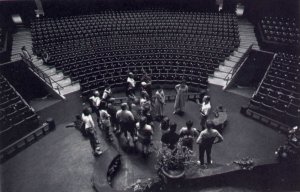
 In Awe Of Theater
In Awe Of Theater

 In Awe Of Theater
In Awe Of Theater
by Robert S. Robbins
The theater has become an important cultural influence in my life. Most significantly, it has reshaped my thoughts on art and the community. The theater has served to make the arts a more vivid reality to me and less a futile, cerebral exercise. When I return home from an exhilarating night at the theater, I feel that I've really taken something away from the theater. My appreciation is more genuine than my desultory interest in poetry or painting. This has forced me to reexamine my thoughts on many subjects. I've been giving more consideration to the importance of the audience, the possibility of significant value in art works, and the responsibilities of the artist to share his vision with interested parties.
Williamsport has an impressive theater community for a city of its size. There are four theaters which make frequent playgoing possible; the Community Theater League, the Arena Theater at Lycoming College, the Community Arts Center, and the Scottish Rite Players at the Scottish Rite Auditorium. Of these, the Community Theater League and the Arena Theater have provided me with many cherished memories of truly satisfying cultural events. I like the Community Theater League because it is a cozy and intimate space. Although the theater is rather shabby and dilapidated, it creates an impression of authenticity. I don't feel intimidated at the CTL because it is more like a run down home than an institution. Technically, the Community Theater League's playing space is a thrust stage, theater-in-the-round, but it is actually floor level. The audience frequently has to walk through the scenery to take their seats. During the performance, the actors are on the same level as the audience and physically within arm's reach. This creates the curious impression that one is merely seated in a room where an intense drama is taking place. There is no real sense of being in a theater because all the actors and props are as close to you as they would be at home during some domestic dispute. I believe nothing else could possibly bring the arts closer to you. At the CTL, the unreal is made a presence in this world and I experience genuine awe for the arts.
 The Arena
Theater at Lycoming College has also provided many evenings of enchantment.
Arena Theater productions feature elaborate and realistic sets and lavish
period costumes. Although less intimate than the CTL, they frequently create
a better illusion of reality and make the past come alive. The theater is
very attractive with wood paneled circular walls and a high ceiling
featuring a dazzling array of spotlights. The atmosphere is more collegiate
which brings back fond memories. The Arena Theater also has a thrust stage
with the audience seated around it but there is much more distance between
the patrons and the actors. They tend to select plays that are classics of
world drama so the literary value of the material is higher than the
Community Theater League's fare.
The Arena
Theater at Lycoming College has also provided many evenings of enchantment.
Arena Theater productions feature elaborate and realistic sets and lavish
period costumes. Although less intimate than the CTL, they frequently create
a better illusion of reality and make the past come alive. The theater is
very attractive with wood paneled circular walls and a high ceiling
featuring a dazzling array of spotlights. The atmosphere is more collegiate
which brings back fond memories. The Arena Theater also has a thrust stage
with the audience seated around it but there is much more distance between
the patrons and the actors. They tend to select plays that are classics of
world drama so the literary value of the material is higher than the
Community Theater League's fare.
Now that I've praised local theater to the skies, it is time to step back and be more critical. Community theater is generally not considered to produce great art. The acting is bad, the stage sets are primitive, and the interpretation of the dramatic work is almost never inventive. Worst of all, community theaters prefer insubstantial comedies and musicals to serious drama or tragedy. For instance, theater managers refuse to do Eugene O'Neill's work because he is "too dark", an unbelievably superficial attitude towards a great tragedian. And Shakespeare has become a crutch for the theater, an easy means of asserting its artistic integrity. Unfortunately, all too often I find theater to be surprisingly shallow and completely lacking in artistic ambition. So how does this superficial theater nevertheless inspire awe and consistently provide profound experiences? This question is not easily answered. On the one hand, many talented people put a lot of effort into a production and it is clearly visible on the stage. But if you were to consider the production on its intellectual and artistic merits you would find there is nothing really up there. As I see it, the problem lies in the distinction that can be made between what is attributable to the theater artists and what is attributable to an subjective state which is more to the credit of a sensitive spectator. One thing is sure, great theater requires a great audience. The ideal audience member for a performance is a sensitive soul, a true aesthete, who will be deeply affected by the drama if not moved to tears. Without an appreciative audience, all the effort that has been put into a production will have gone to waste because the creation will not otherwise remain after the run. Nobody comes along later and discovers the true merit of the work because it has come and gone with only a select few having seen it. It doesn't help that theater, like poetry, has a small audience. It does not reach a significant portion of the community, although many people in the theater kid themselves on this score.
In my case, I suspect some of the "stage magic" is attributable to the fact that my imagination is powerfully engaged during a theater performance. The illusion of the unreal becoming a presence in this world thrills me and excites my mind as nothing else can. Once fantasy blends into reality, the imagination is liberated and can consider the possibility of realizing the soul's deepest desires. An insubstantial dream world is poised to become a substantial reality and years of futility will finally end! The theater is a powerful antidote to a life that has become too cerebral, too imaginary. The life of the mind is a life of despair because nothing can ever be realized. The theater presents an empowering image of fantasy being played out in reality. This is perhaps the vague wish behind the theater community's hope the audience will be inspired to change their lives after the show.
Although the theater speaks to my soul, I still find it impossible to identify with the theater community. The theater is the artistic home of performers. It is a world completely given over to the needs of a performer. The musical has become a staple of the theater because it gives the performer a chance to demonstrate his/her skills as a dancer or singer. I've often found the audience politely applauding a high note or a difficult dance step which the theater willfully mistakes for the more profound admiration due real artistry. The theater is certainly not the artistic home of writers, not even playwrights, or dreamers whose vision may unify a production. It is mired in theatrical conventions and pragmatic considerations which allow little room for experimentation, abstraction, or even idealism. Having read a great deal of modern drama before setting foot in a theater, I've found it a very different world from its literary persona. There is none of the intellectual exploration of ideas or the dreamer's pursuit of idealized beauty in its well-structured conflicts, its displays of virtuosity, or its imperative to entertain. I cannot imagine any visionary artist finding a warm welcome among this community, much as the theater may wish to believe otherwise. It is not surprising that the theater will refer to a playwright, poet, or director as an "artist-in-residence", like they've taken in a border!
But although the theater will slight a true artist, it is important not to do the same and reject theater altogether. As much as I've been disappointed by the theater, I still find it too valuable to abandon. Although a production may have little intrinsic value, it can empower my imagination to such a degree that I feel like a god. For instance, one of my fondest memories is of an amateur production of Shakespeare's "Much Ado About Nothing", performed in the outdoor court area of a mall. There was nothing memorable about the show itself. However, it did place Shakespeare, physically place him, in a context that made for a surreal juxtaposition. It was an Elizabethan drama played out before the storefronts of a mall. As the play dragged on into the evening, I particularly remember the image of the actors performing against the backdrop of a clothing store's brightly lit display windows. In a way, the scene was a vision of separate worlds coming together, suggesting a new relationship. There were also some biplanes flying overhead as part of an air show. They disrupted the play but added to the surreal effect. So whatever the merits of a production may be, something beautiful and extraordinary can still be born of it as its internalized and ignites the true aesthete's imagination. I often experience a creative rush at the theater, a feeling of infinite power. There is also the curious conviction of really possessing some magic, as if I've grasped the sublime. It is unlikely that anyone else has been so affected by the performances I've seen. After receiving such an astonishing gift from artists who have worked so hard to make an effect, I'm often left wondering if I owe them something for this awe I feel.

